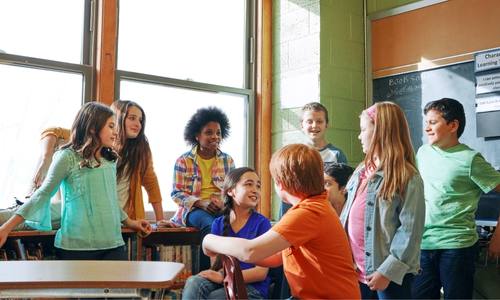“Anyone who stops learning is old, whether at twenty or eighty. Anyone who keeps learning stays young. The greatest thing in life is to keep your mind young.” said Henry Ford
This quote in one line explains the importance of learning. So what is the actual definition of learning?
Learning is the process of acquiring new skills, knowledge, understanding, and values. This is something individuals can do by themselves, but it's generally made easier with education. With the help of educational support, learning can happen more efficiently. Apart from inculcating numbers and academics we as educators also need to focus on the overall well-being of the student. To focus on holistic growth of the child, it is important to teach social-emotional learning.
So what is Social Emotional Learning and why is it important? Social Emotional Learning, as the name suggests, is the process of learning social and emotional skills. The world now is very fast-paced and the challenges faced today are very different from our parents. The new generation's bodies and minds are constantly evolving and finding it difficult to cope with new ideas and manage their technological influences. Hence, inculcating social emotional awareness at an early age is one of the most important foundations that parents and school can give a child.
Research states that Social-emotional learning is also vital for students because it teaches them crucial life skills, including the ability to understand themselves, develop a positive self-image, also take responsibility for their actions, and maintain relationships with the people around them. Teacher training institutes have understood its importance and have started incorporating it in the curriculum.
The teacher training institute emphasises that in order to ensure students excel academically, the learner’s other social and emotional needs have to be met too. Recently, the terms “social-emotional learning” and “whole-child” have become buzzwords in the world of schooling. This concept has been around for a while and more than two decades either in the form of conflict resolution or character education, these programs have set their foundation in the social-emotional learning framework now.
Social emotional Learning Framework consists of five competencies: self-awareness, self-management, social awareness, relationship skills and responsible decision making.
Social-emotional development consists of three main areas of children's self-regulation:
-
Acting: Behaving in socially appropriate ways and ways that foster learning.
-
Feeling: Understanding others' emotions and regulation of one's own emotions.
-
Thinking: Regulating attention and thoughts.
Research has found out that children who are emotionally well-adjusted and socially competent have a higher chance of enjoying success in education, acquiring future employment, and establishing secure and stable social relationships. The chances are less that they are involved in criminal activities, substance use and abuse, and mental health problems. It has also been found out that social and emotional deficiencies could be a major obstacle for children to be well-adapted in schooling and result in many behavioural problems such as disruptive behaviours, aggression, oppositional, and non-compliant behaviours. Hence, it is important that teacher training institutes incorporate this topic in the curriculum.
As an educator, how can we inculcate social-emotional learning activities in school?
-
Playing games
-
Learning about student interests.
-
Writing a story together
-
Encouraging positive self-talk. SEL skills: Self-awareness, self-regulation
-
Random acts of kindness. SEL skills: Relationship skills, social awareness
-
Morning questions
Research indicates that 40 % of teachers leave the profession within their first five years of teaching and reason for it is they lose their passion for teaching because they feel valued, the working hours are long and they are underpaid. The pressure of having to boost test results to meet achievement benchmarks creates stress that can have a devastating impact on their mental health and wellbeing. The five feelings that the teachers experience are worry, anxiety, sadness, fear and overwhelmed. It is witnessed that as teachers deliver SEL lessons, they are observing countless and positive changes among their students. These lessons taken by teachers teach students skills and competencies that help them to effectively manage emotions, build resilience, and improve their relationships. This can result not only in personal and academic growth for students but also for the teachers who are also learning these skills as they teach them! Hence, as stated above, teacher training institutes should incorporate this as a part of the curriculum so that the teachers are well equipped to teach the students.
Also read,
Addressing the Emotional and Social Needs of Gifted Students
/blog-addressing-the-emotional-and-social-needs-of-gifted-students
How to work on socio-emotional development of a child?








